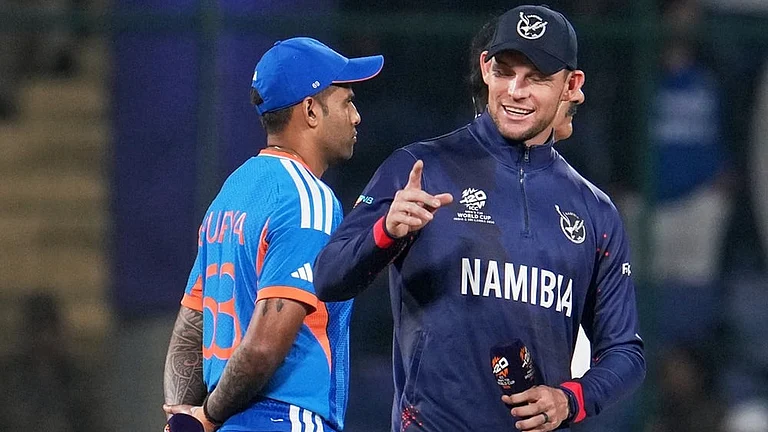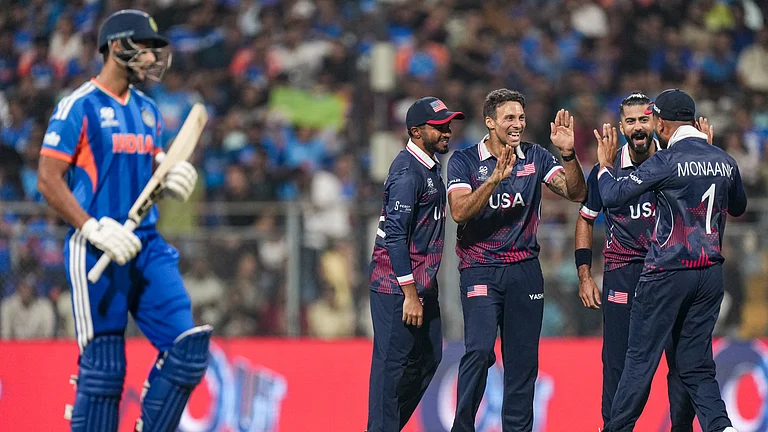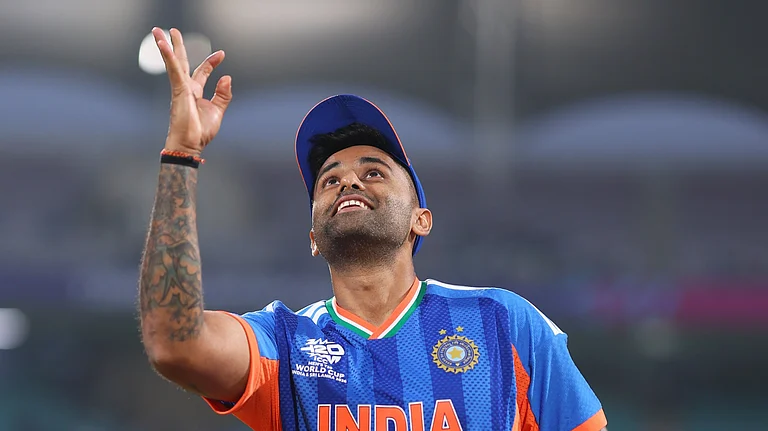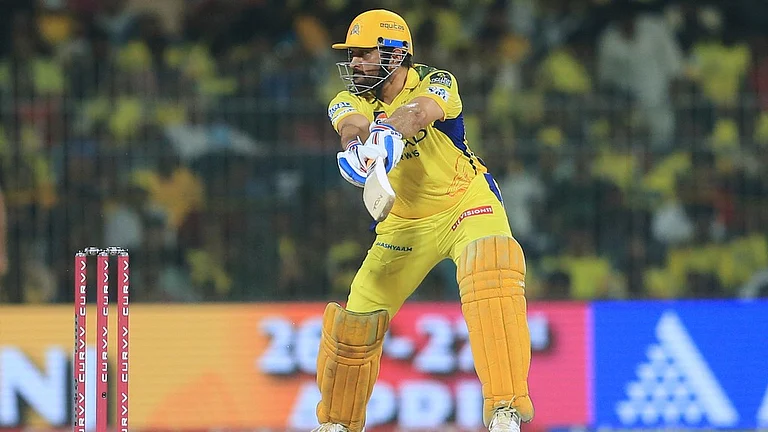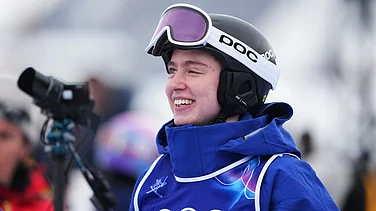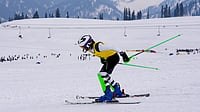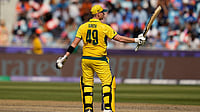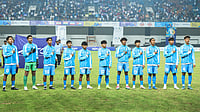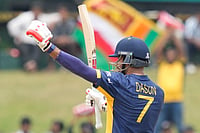
Animesh Kujur clocks 20.77 seconds in men's 200m sprint final to win gold
Murali Sreeshankar produces 8.13m in his final attempt to claim men's long jump title
Annu Rani comes up trumps in women's javelin throw with fourth-round effort of 62.01m
Ace sprinter Animesh Kujur, senior javelin thrower Annu Rani and long jump star Murali Sreeshankar won their respective events at India’s first-ever World Athletics Continental Tour competition in Bhubaneswar on Sunday (August 10, 2025). The bronze-level event was held without any major glitches, but the quality of competitions did not rise to especially great heights.
There was drama in store for Kujur. The 22-year-old athlete pulled up after a few paces in his men's 100m heat race in the morning session. He then came out to run his 200m heat just half an hour later and qualified for the final with a time of 20.99 seconds.
In the evening session, Kujur clocked 20.77 seconds in the 200m final to win the gold medal. Ko Seunghwan of Korea finished second with a time of 20.95 seconds, while another Indian athlete, Ragul Kumar, took third place with 21.17 seconds. Kujur, representing Odisha, currently holds national records in both the 100m (10.18 seconds) and 200m (20.32 seconds) events.
Meanwhile Sreeshankar, representing JSW, was up against rising teenager Shahnavaz Khan, who won gold at the Uttarakhand National Games in February 2025. The 17-year-old Khan was leading with his fourth round jump of 8.04m, while Sreeshankar was second with a leap of 7.95m.
But the 26-year-old Sreeshankar produced a jump of 8.13m in his final attempt to take the gold medal in dramatic fashion for his fourth title in a row since coming back from a long injury lay-off. He is, however, yet to breach the Tokyo World Championships direct entry mark of 8.27m. Khan became the latest entrant to the prestigious 8m club in Indian men's long jump, his previous best being 7.90m.
In women's javelin throw, Asian Games champion Annu Rani bagged the gold medal with a fourth round throw of 62.01m, thereby strengthening her chances of making it to the Tokyo World Championships scheduled for September 2025. Rani, representing Uttar Pradesh, had another impressive 60m-plus throw—a 61.01m effort in her fifth attempt—as she continued her good form this season.
Before Sunday’s event, the 32-year-old was ranked 30th in the Road to Tokyo list after her season's best of 62.59m in Poland on August 6, 2025. 36 athletes are set to compete in the women's javelin throw event in Tokyo, although she is yet to breach the automatic qualification mark of 64m for direct entry.
On Wednesday prior to this event, Rani registered her first 60m-plus throw in more than a year as she won the javelin competition title at the 8th International Wieslaw Maniak Memorial meet in Szczecin, Poland. Her national record stands at 63.82m, which she achieved in 2022.
The victories by Kujur, Sreeshankar and Rani not only highlight their individual prowess but also impact their qualification prospects for upcoming global championships such as Tokyo.
Indian Men’s Javelin Throw, Relay Teams Face Challenges
The men's javelin throw event disappointed the crowd at Kalinga Stadium as Indian participants barely crossed the 80m mark during the competition. Sri Lanka's Rumesh Tharanga Pathirage, who finished third in the NC Classic hosted by Neeraj Chopra on July 5 in Bengaluru, took the men's javelin gold medal with his first round throw of 86.50m. This performance allowed him to breach the World Championships direct entry mark of 85.50m.
India's promising 20-year-old Shivam Lohakare, who recently joined the 80m club at the Indian Open Athletics Meet in Pune with a throw of 80.95m, secured silver with an effort of 80.73m. Another Sri Lankan athlete, Sumedha Ranasinghe—who has already secured a direct spot in World Athletics Championships—finished third with a throw of 80.65m. India's Rohit Yadav (80.35m) and Asian Championships silver winner Sachin Yadav (79.80m) were placed fourth and fifth respectively.
Shaili Singh won the women's long jump event with a below-par effort of 6.28m. The Indian men's 4x400m relay team disappointed with a second-place finish behind Sri Lanka (3:08.22), clocking a time of three minutes and eight point thirty-seven seconds (3:08.37). The Indian quartet comprised T Santhosh Kumar, Vishal TK, Amoj Jacob and Dharamveer Choudhary.
International athletes' strong performances and Indian relay setbacks influence team morale and qualification chances for future world events.
Bronze-Level Meet Participation, Organisation
The one-day competition carried a prize purse of USD 25,000 and saw more than 150 athletes from 17 countries competing across 19 events at Bhubaneswar’s Kalinga Stadium. Out of all participating athletes, more than 90 were from India while the rest represented various foreign nations.
Among foreign countries represented at this World Athletics Continental Tour bronze level event, Nepal sent the largest contingent with 13 athletes, followed by Sri Lanka (10) and Malaysia (nine). South Africa and Great Britain each sent four athletes to participate in different track and field events.
The Indians taking part in various events were selected based on their best performance of the season up until July 12, 2025. Only those Indian athletes who were ranked within the top seven nationally were considered eligible for participation at this prestigious international meet.
Since it was an invitational competition rather than an open national championship, Indian participants represented their respective departments, employers, private entities or states such as NCOE Bangalore, NCOE Trivandrum, Army, Air Force, Reliance Industries Limited (RIL), JSW Sports and others in individual events.
The organisers had initially planned to include both the women's 4x400m relay race as well as the mixed 4x400m relay event; however, both were scrapped due to lack of participation—minimum three teams—from other countries.
The Odisha government, in collaboration with the Athletics Federation of India (AFI), organised the competition, ensuring that all technical aspects were managed efficiently. The scale and diversity of participation reflect India's growing role as a host for major international athletics competitions.
(With PTI inputs)







